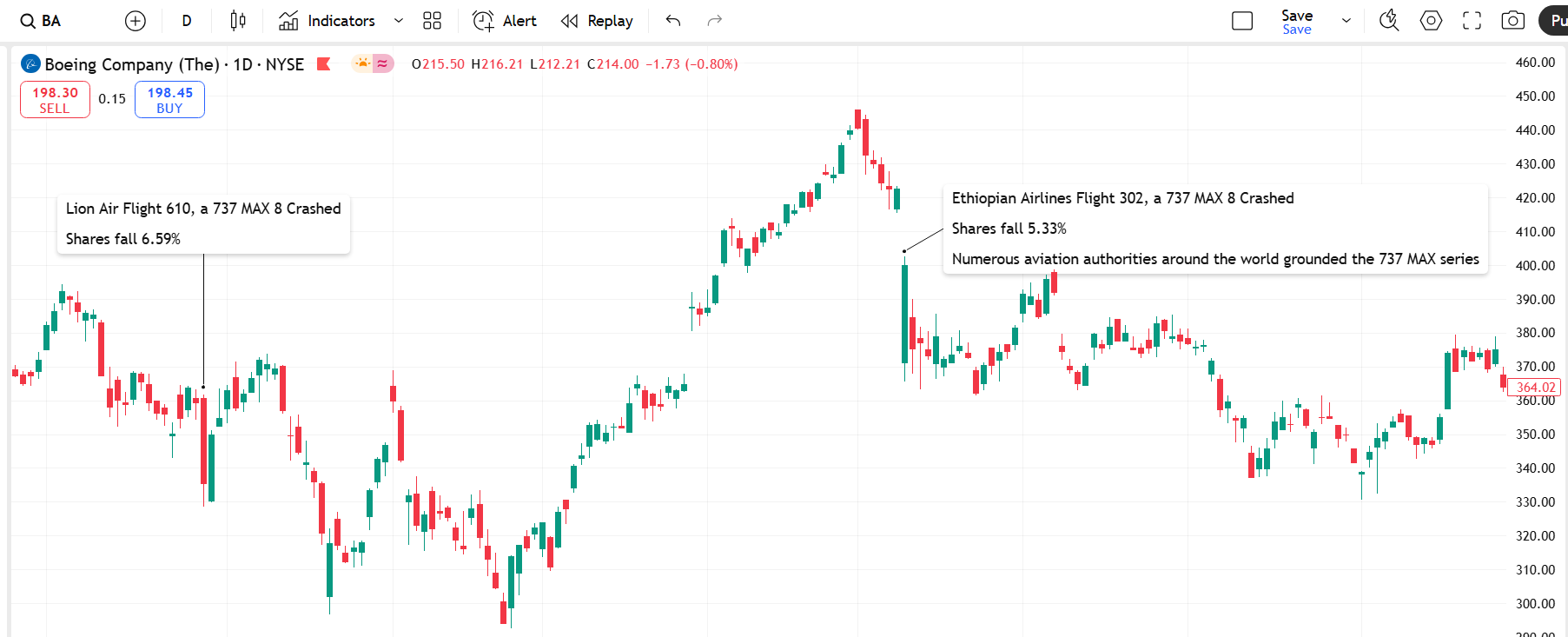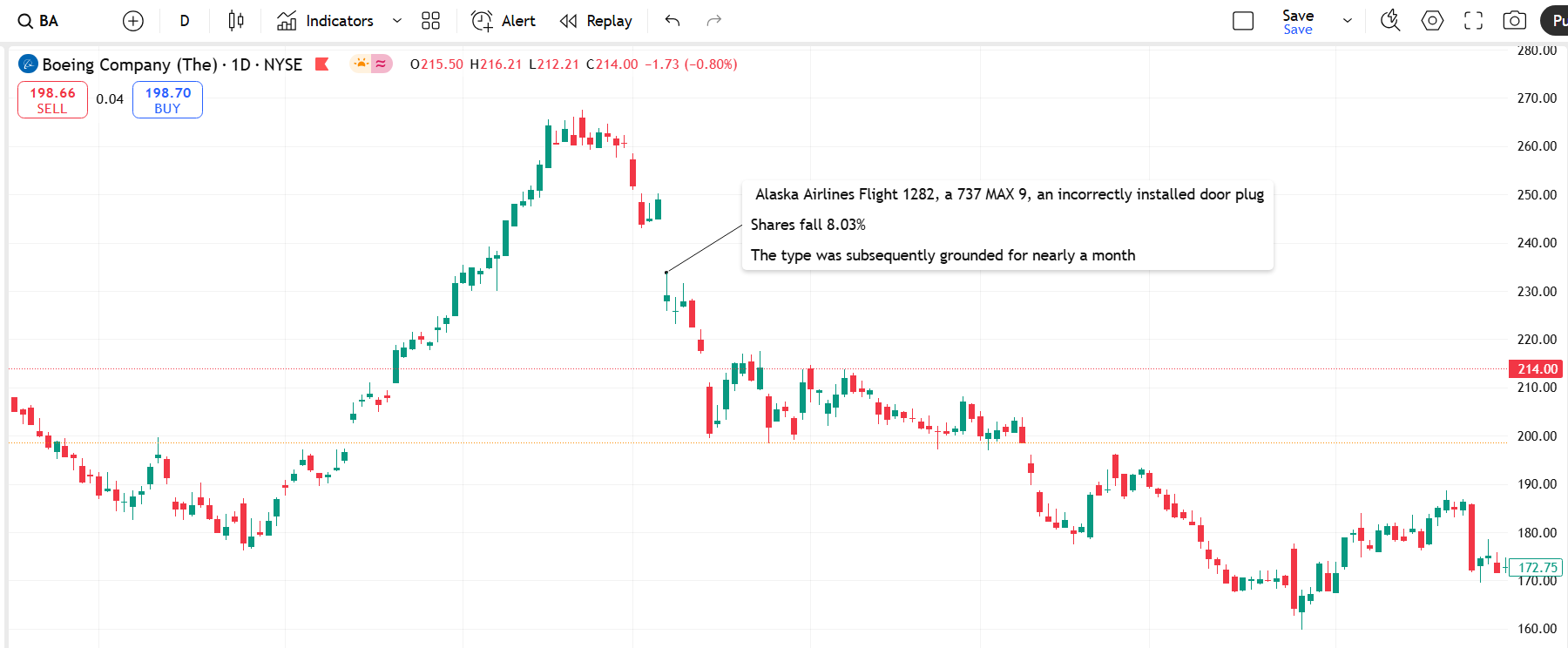Boeing Plunges 8% Premarket After Fatal 787 Crash in India — What’s Next?
A Boeing 787-8 aircraft operated by Air India, en route to London, crashed shortly after takeoff in Ahmedabad.The aircraft, registered as VT-ANB, was nearly 12 years old and powered by two General Ele

A Boeing 787-8 aircraft operated by Air India, en route to London, crashed shortly after takeoff in Ahmedabad.
The aircraft, registered as VT-ANB, was nearly 12 years old and powered by two General Electric GEnx engines. It has now become the first Boeing 787 to be written off due to a crash, marking a grim milestone for the model.
Following the accident, Sardar Vallabhbhai Patel International Airport in Ahmedabad was shut down. As of press time, the Air India crash has left 242 dead. Indian Prime Minister Modi posted on X: "The tragedy in Ahmedabad has shocked and saddened us. It’s heartbreaking beyond words. My thoughts are with all those affected. I’m in touch with ministers and authorities working to provide support."

Boeing shares fell nearly 8% in premarket trading.
A History of Boeing Accidents
Historical data shows a disturbing pattern of Boeing accidents in recent years.
October 29, 2018: A Lion Air 737 MAX 8 crashed shortly after takeoff, killing all 189 people on board.
March 10, 2019: An Ethiopian Airlines 737 MAX 8 crashed after takeoff, killing all 157 passengers and crew. The incident led to a global grounding of the MAX series.

January 5, 2024: An Alaska Airlines 737 MAX 9 suffered a mid-air door plug blowout. While there were no serious injuries, the incident triggered widespread safety concerns and led to a nearly one-month grounding of the model.

This string of safety failures has significantly damaged Boeing’s credibility. In 2024, Boeing delivered just 348 aircraft, down almost 35% from 2023, and less than half the deliveries made by rival Airbus. Net orders also plunged to 569, a nearly 60% year-over-year drop.
Airbus Gains as Boeing Stumbles
Boeing’s series of accidents has left passengers doubting the safety of its planes, and many airlines are shifting their fleet strategies toward Airbus.
In August 2024, KLM Royal Dutch Airlines announced a €7 billion investment to replace its Boeing aircraft with Airbus jets. This is a major shift, considering that Boeing planes account for nearly 90% of KLM’s current fleet of 112 aircraft.
A larger strategic threat comes from China—the world’s largest aviation market. Amid U.S.-China trade tensions, Beijing previously halted Boeing aircraft deliveries to domestic airlines. Although deliveries have now resumed, China is increasingly tilting toward Airbus.
According to Bloomberg, China is considering ordering several hundred Airbus jets as early as July, coinciding with a visit by European leaders to mark the 50th anniversary of China-EU diplomatic ties. The deal could include 200 to 500 aircraft, encompassing both narrow-body and wide-body models.
Airbus Poised to Capitalize
Airbus is brimming with confidence. The company says it has around 40 undelivered single-aisle jets awaiting engine supply. While lavatory equipment delays have slowed down A350 assembly, Airbus claims supply chain conditions have improved, and it remains on track to meet delivery targets.
Airbus forecasts global demand for 34,250 single-aisle jets and 8,200 wide-body aircraft over the next 20 years.
What’s Next for Boeing Stock?
Looking at Boeing’s past market performance after major incidents, recovery is uncertain. While shares sometimes rebound quickly, more often they enter prolonged downtrends, especially when grounded models are involved.
Following the 2019 and 2024 incidents, aircraft groundings were followed by sharp and extended stock declines.
What happens next depends heavily on the actions of regulatory investigators. A decision to ground the affected aircraft model would be a serious blow to Boeing. Even if regulators avoid grounding, airlines are already shifting to Airbus, signaling that Boeing could face a long period of market weakness.
Disclaimer: The views in this article are from the original Creator and do not represent the views or position of Hawk Insight. The content of the article is for reference, communication and learning only, and does not constitute investment advice. If it involves copyright issues, please contact us for deletion.